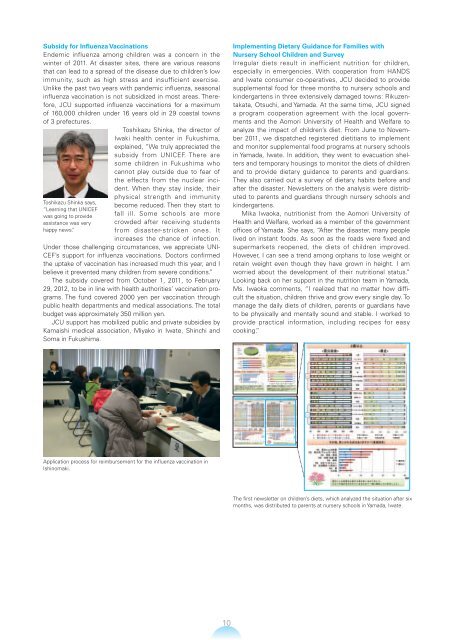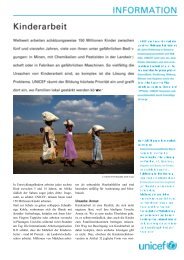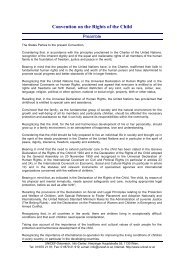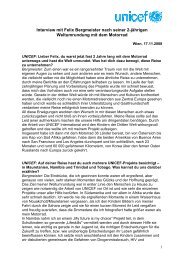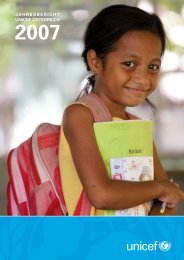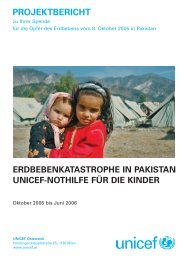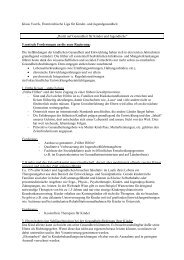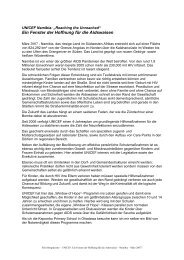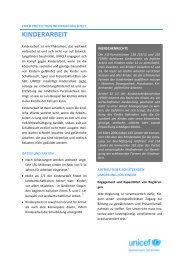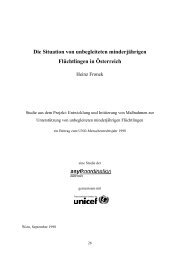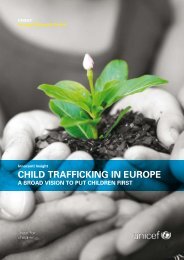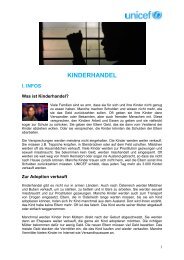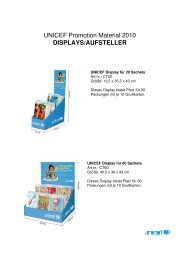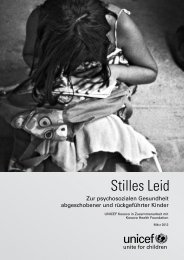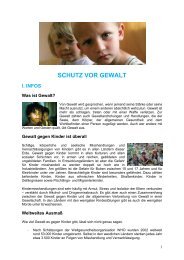Create successful ePaper yourself
Turn your PDF publications into a flip-book with our unique Google optimized e-Paper software.
Subsidy for Influenza Vaccinations<br />
Endemic influenza among children was a concern in the<br />
winter of 2011. At disaster sites, there are various reasons<br />
that can lead to a spread of the disease due to children’s low<br />
immunity, such as high stress and insufficient exercise.<br />
Unlike the past two years with pandemic influenza, seasonal<br />
influenza vaccination is not subsidized in most areas. Therefore,<br />
JCU supported influenza vaccinations for a maximum<br />
of 160,000 children under 16 years old in 29 coastal towns<br />
of 3 prefectures.<br />
Toshikazu Shinka, the director of<br />
Iwaki health center in Fukushima,<br />
explained, “We truly appreciated the<br />
subsidy from UNICEF. There are<br />
some children in Fukushima who<br />
cannot play outside due to fear of<br />
the effects from the nuclear incident.<br />
When they stay inside, their<br />
Toshikazu Shinka says,<br />
“Learning that UNICEF<br />
was going to provide<br />
assistance was very<br />
happy news.”<br />
physical strength and immunity<br />
become reduced. Then they start to<br />
fall ill. Some schools are more<br />
crowded after receiving students<br />
from disaster-stricken ones. It<br />
increases the chance of infection.<br />
Under those challenging circumstances, we appreciate UNI-<br />
CEF’s support for influenza vaccinations. Doctors confirmed<br />
the uptake of vaccination has increased much this year, and I<br />
believe it prevented many children from severe conditions.”<br />
The subsidy covered from October 1, 2011, to February<br />
29, 2012, to be in line with health authorities’ vaccination programs.<br />
The fund covered 2000 yen per vaccination through<br />
public health departments and medical associations. The total<br />
budget was approximately 350 million yen.<br />
JCU support has mobilized public and private subsidies by<br />
Kamaishi medical association, Miyako in Iwate, Shinchi and<br />
Soma in Fukushima.<br />
Application process for reimbursement for the influenza vaccination in<br />
Ishinomaki.<br />
10<br />
Implementing Dietary Guidance for Families with<br />
Nursery School Children and Survey<br />
Irregular diets result in inefficient nutrition for children,<br />
especially in emergencies. With cooperation from HANDS<br />
and Iwate consumer co-operatives, JCU decided to provide<br />
supplemental food for three months to nursery schools and<br />
kindergartens in three extensively damaged towns: Rikuzentakata,<br />
Otsuchi, and Yamada. At the same time, JCU signed<br />
a program cooperation agreement with the local governments<br />
and the Aomori University of Health and Welfare to<br />
analyze the impact of children’s diet. From June to November<br />
2011, we dispatched registered dietitians to implement<br />
and monitor supplemental food programs at nursery schools<br />
in Yamada, Iwate. In addition, they went to evacuation shelters<br />
and temporary housings to monitor the diets of children<br />
and to provide dietary guidance to parents and guardians.<br />
They also carried out a survey of dietary habits before and<br />
after the disaster. Newsletters on the analysis were distributed<br />
to parents and guardians through nursery schools and<br />
kindergartens.<br />
Mika Iwaoka, nutritionist from the Aomori University of<br />
Health and Welfare, worked as a member of the government<br />
offices of Yamada. She says, “After the disaster, many people<br />
lived on instant foods. As soon as the roads were fixed and<br />
supermarkets reopened, the diets of children improved.<br />
However, I can see a trend among orphans to lose weight or<br />
retain weight even though they have grown in height. I am<br />
worried about the development of their nutritional status.”<br />
Looking back on her support in the nutrition team in Yamada,<br />
Ms. Iwaoka comments, “I realized that no matter how difficult<br />
the situation, children thrive and grow every single day. To<br />
manage the daily diets of children, parents or guardians have<br />
to be physically and mentally sound and stable. I worked to<br />
provide practical information, including recipes for easy<br />
cooking.”<br />
The first newsletter on children’s diets, which analyzed the situation after six<br />
months, was distributed to parents at nursery schools in Yamada, Iwate.


